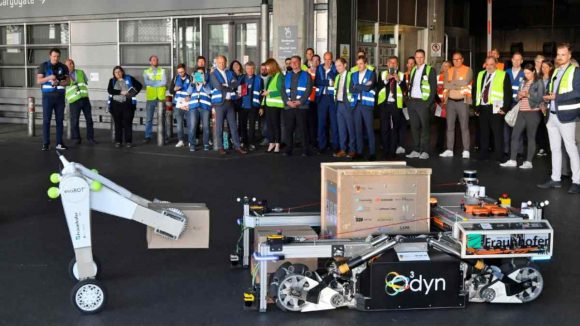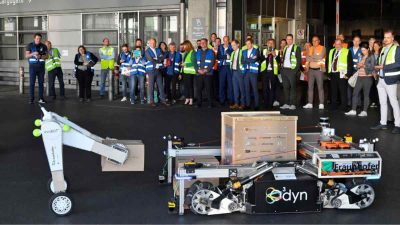An autonomous robot dog identifying accessible storage locations at a warehouse is a “groundbreaking” research project that could “shape the future of air cargo.”
The Fraunhofer Institute for Material Flow and Logistics IML recently demonstrated its initial results for the “Digital Testbed Air Cargo” (DTAC) project at the Munich Airport. Fraunhofer IML says the solution could “optimally use the potential of digital technologies.”
In addition to the robot dog, a transport robot automatically moves pallets to storage locations and places parcels onto a conveyor belt. Frankfurt University helped present the first “autonomous robot dog” results to a high-level panel of experts and leaders.
Shaping the future of air cargo
The chief commercial officer of Munich Airport, Jan-Henrik Andersson, is optimistic about the results. He calls it “future-orientated.” Air cargo volumes are increasing rapidly in Germany. “The staff recruitment challenges, digitalization, and robotics will help us make cargo and baggage handling more efficient. Jobs in these areas (will become) more attractive in the near future,” says Andersson.
Fraunhofer IML says researchers believe that the degree of automation in air cargo handling will increase rapidly. “On the hardware side, as today has clearly shown, we are already well advanced. In the future, artificial intelligence (AI) will support us in coordinating and controlling the vehicles,” says Michael Henke, executive director at Fraunhofer IML.
The air cargo industry is currently battling two main problems. A shortage of staff on the one hand and high throughput rates on the other. “This will only be successful if we make use of all the technological developments available to us for process optimization,” says Christian Bernreiter, Bavarian state minister for housing.
Research continues
The German government has funded the project with nearly $8 million, which will support further research on automating warehouses. The project will run until the end of September 2024.
Researchers are still questioning how to optimize the efficiency and performance of the air freight transport chain. Better networking and digitization of processes can achieve this.
“During the demonstration of the project in Munich, several autonomous and automated devices were successfully used. [It was] to either completely take over some very labor-intensive and repetitive steps at relevant interfaces in the handling process or to support employees in their physically demanding work,” says Fraunhofer IML.
However, the robots were given the primary roles of working on different tasks.
NOW READ: The truth about warehouse automation and employment
Photo credit: Fraunhofer Institute for Material Flow and Logistics IML
About the author
Mia is a multi-award-winning journalist. She has more than 14 years of experience in mainstream media. She's covered many historic moments that happened in Africa and internationally. She has a strong focus on human interest stories, to bring her readers and viewers closer to the topics at hand.











